Papers by Oscarina Susana Vilela Conceição

International Journal of Education Economics and Development, 2024
The objective of the paper is to contribute to a better understanding
of the various roles playe... more The objective of the paper is to contribute to a better understanding
of the various roles played by research-based spin-offs (RBSOs) in knowledge
dissemination. It investigates if RBSOs act as connectors and knowledge
translators, both between different types of organisations within an innovation
ecosystem and across different geographical scales and knowledge
environments. This latter role has been relatively less investigated but is
important to open local innovation ecosystems. The paper analyses the
networks formed by Portuguese RBSOs in the context of research, technology
and product development projects. The results suggest that RBSOs play an
intermediary role in the country’s innovation ecosystem, which can assume
different forms. In the national networks, they frequently bridge research and
downstream organisations, contributing to the dissemination of knowledge
within the ecosystem. In the international networks, their most important role
may be as connectors and conveyors of advanced knowledge produced in
external knowledge environments.
Procedia Computer Science, 2022
This doctoral thesis would not have been possible without the encouragement, support, and insight... more This doctoral thesis would not have been possible without the encouragement, support, and insights of many people. First, I would like to thank my advisors Professors Ana Paula Faria and Margarida Fontes for their guidance and feedback. Throughout this process, their comments and constructive criticisms were essential to the improvement of this research. I cannot fail to mention the personal support I felt which was quite decisive for the completion of this thesis.

IGI Global eBooks, 2022
It is important to understand the role of higher education institutions in promoting entrepreneur... more It is important to understand the role of higher education institutions in promoting entrepreneurship and supporting the creation of new companies to commercialize the knowledge generated in the academic field. The objective of this chapter is to analyze the creation and survival of academic spin-off companies in Portugal from 2005 to 2015. The results show that financial crisis did not change the academic spin-offs dynamics patterns, which shows that, even in crisis period, academic spin-offs maintain creation high levels (perhaps due to necessity-driven) and reveal survival high rates. In addition, a questionnaire was carried out to obtaining the academic entrepreneur's perception about the entrepreneurial process (individual characteristics; organizational resources/capabilities and entrepreneurial orientation). In fact, these results can help policy makers to reflect on the motivations and difficulties of the entrepreneurial process of this type of companies, and thus, develop an effective regional policy agenda in supporting the academic spin-offs development.

The Impact of HEIs on Regional Development
A stronger focus on entrepreneurship could be a smart strategy for countries that wish to success... more A stronger focus on entrepreneurship could be a smart strategy for countries that wish to successfully compete in a global market based on knowledge, innovation, and creativity. Higher education institutions are expected to be closer to society as well as to their stakeholders, which means not only that they are able to fulfil their traditional teaching and research mission, but also to trigger tactics and actions that promote solutions with high added value. In fact, new challenges arise, new responses are needed, and innovative approaches are required. This study presents a case study, an innovative co-creation model (students, facilitators, and companies) carried out by the Polytechnic Institute of Cávado and Ave, in Portugal, with its teachers and students, from all study cycles. The results point to the creation of a transformative mindset, based on knowledge and attitudes towards a holistic and sustainability-oriented style.

Innovation, Engineering and Entrepreneurship, 2018
This study intends to explain the entrepreneurial intention using a multivariate model. The purpo... more This study intends to explain the entrepreneurial intention using a multivariate model. The purpose is to generate a more complete explanatory model that can describe the entrepreneurial intentions. It was applied a questionnaire to the 40 master students who attended the curricular unit Entrepreneurship in the 2016/2017 school year. The results show that personal background (gender and attendance of an entrepreneurship course), business knowledge (involvement in patenting activities and protection of intellectual property, possess analytical skills and possess the ability to think critically), entrepreneurial motivations (satisfy a market need and create something for oneself), and the institutional environment (knowledge of IPCA structures support to entrepreneurship) contribute for entrepreneurial intentions of master students. These results are then discussed in terms of theoretical and practical implications for entrepreneurship.

Studies about branding takes a significant role in business science research as branding is an im... more Studies about branding takes a significant role in business science research as branding is an important asset in a particular country, city or region. In this assumption, the main objective of this research is to approach the theme of destination branding focusing on the brand “Porto.”, as well as to identify the specificities of this brand that makes it so successful at national and worldwide levels. The present article began with a bibliographical review about geographies of brands and branding as well as destination branding. It is presented the brand “Porto.” and it is explained how the brand is been built by all Porto stakeholders. The work reveals that the success of brand “Porto.” is a result not only for its creative design but also for the involvement of the region’s stakeholders, in particular for the strong and continued adherence of civil society to the project. The end result reinforces the importance of open innovation in the sustainable development process and buildi...

Handbook of Research on International Business and Models for Global Purpose-Driven Companies, 2021
Design thinking in the human resources area is still a recent issue little known and exploited ev... more Design thinking in the human resources area is still a recent issue little known and exploited even at an international level. It has only recently begun to be worked on and shared by organizations, and it is pointed out as being one of the most important competences of the 21st century. It refers to a style of thinking that combines the senses with the context of a problem, creativity in the creation of new points of view, and solutions and rationality in the analysis and search for solutions to the context. The present research used the Employee Experience DT Model, applied on a multinational company and developed within three long sessions of brainstorming and brainwriting. The main conclusions outlined that DT stimulates the process of continuous improvement, reinforces teamwork, as well as creativity and effort in solving problems. Furthermore, it sensitizes the administration for the current existing problems, compromising it in their resolution, and working in partnership wit...
RENT XXII, Research on …, 2008
This paper addresses the conditions in which research-based spin-offs (RBSOs) conduct their role ... more This paper addresses the conditions in which research-based spin-offs (RBSOs) conduct their role in the transformation of scientific and technological knowledge in economic value, focusing on their commercialisation strategies. We discuss the conditions ...
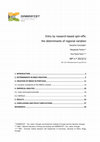
Reflecting the increasing number of research based spin-offs (RBSOs) created since the nineties, ... more Reflecting the increasing number of research based spin-offs (RBSOs) created since the nineties, previous studies focus their analysis on the factors that influence university entrepreneurship. However, empirical studies that investigate the determinants of variation on RBSO creation across regions are scarce. Using a unique self-collected dataset that comprehends the population of RBSOs created in Portugal from 1979 until to 2007 we investigate the intensity of spin-offs creation across regions, by focusing on the characteristics of the universities and the region in which the spin-off is located. Our results suggest that the quality and prestige of the universities located in a municipality, as well as the presence of university-affiliated incubators and/or university research parks have a positive impact on the intensity of RBSO creation. Regarding the regional characteristics, the availability of qualified human capital and the regional demand size seem to exert an important effect on spin-off activity across regions.
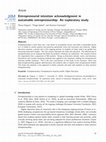
Journal of Innovation Management
Entrepreneurship is more than ever a key factor to successfully surviving and building a sustaina... more Entrepreneurship is more than ever a key factor to successfully surviving and building a sustainable future, as it is linked to certain positive and proactive personality traits and innovation and creativity. Higher education plays an important role in this ongoing process, as students of today need to be guided into becoming tomorrow's leaders. The 21st century demands new skills and education. Regarding entrepreneurship, it will be more effective the better the associated profile with the student is understood in terms of entrepreneurial intention. This research involves 101 respondents from a population of 300 students. Taking as dimensions attitude, norms, and behaviour, hierarchical and k-means clustering methods were applied to the responses, yielding five entrepreneurial intention profiles (clusters). This is the main contribution of this study to the literature, which may help entrepreneurship program administrators and students alike to improve on their entrepreneurial ...
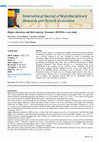
International Journal of Multidisciplinary Research and Growth Evaluation
The third mission appears as a bridge between Higher Education Institutions and their environment... more The third mission appears as a bridge between Higher Education Institutions and their environment, becoming a key element for solving current problems that hopelessly need a dynamic response in real time. Through the transfer of knowledge and technology, Higher Education Institutions stimulate industry and society, becoming a key agent in the approach to innovation and entrepreneurship, as a facilitator for sustainability development. This study aims to understand the benefits of Higher Education Institutions Third Mission dynamics as a stimulating factor in the globalisation of the economy and the evolution of the community, the global development of industry and the evolution of society. It uses a case study of the 1st Batch of the DEMOLA Project, developed in the 1st semester of 2021, at the Polytechnic Institute of Cávado and Ave, Portugal. Results seem to show that co-creation projects develop a big set of the needed 21st skills among all participants as well as enhance the in...

This study intends to explain the entrepreneurial intention using a multivariate model. Previous ... more This study intends to explain the entrepreneurial intention using a multivariate model. Previous empirical studies use only one class of explanatory variable but our purpose is to generate a more complete explanatory model that can explain the entrepreneurial intention of the students who attended the curricular unit Entrepreneurship. It was applied a questionnaire to the 40 master students who attended the curricular unit Entrepreneurship in the 2016/2017 school year. The results show that that personal background (gender and attendance of an entrepreneurship course), business knowledge (involvement in patenting activities and protection of intellectual property, possess analytical skills and possess the ability to think critically), entrepreneurial motivations (satisfy a market need and create something for oneself), and the institutional environment (knowledge of IPCA structures support to entrepreneurship) contribute for entrepreneurial intentions of master students. These resul...
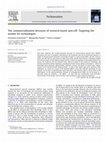
Technovation, 2012
This paper addresses the commercialisation decisions of research-based spin-off firms (RBSOs), fo... more This paper addresses the commercialisation decisions of research-based spin-off firms (RBSOs), focusing on the case of companies specialising in the production and sale of intellectual property-a model of entrepreneurial behaviour increasingly frequent in science-based fields and that researchbased spin-offs may be more prone to adopt, given their specific characteristics. Combining insights from the economics of technological change and the strategic management of technology literature, we discuss the conditions that can influence firms' ability to operate in the market for technology, and advance some theory-driven hypotheses regarding key factors that are likely to determine it-nature of knowledge being exploited, appropriability conditions, location and degree of control upon complementary assets and institutional setting of origin-as well as their impact upon firms' decisions. These hypotheses are tested on a group of 80 European RBSOs, using data collected specifically for this purpose, on the basis of questionnaire-based interviews. This research adds to recent work on the determinants of the commercialisation strategy of technology-based SMEs, but by focusing on a particular group of companies-the RBSOs-we also take into consideration some distinctive characteristics of this group, which introduce some specificity in their innovative behaviour.
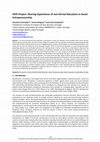
European Conference on Management Leadership and Governance
The social entrepreneurship approach is presented as a basis for helping to solve problems that e... more The social entrepreneurship approach is presented as a basis for helping to solve problems that exist in society. Social economy activities play a key role as they combine innovation with the execution of solidarity relations between the community and the involved environment, thus highlighting their mission and contribution to sustainable development. This study aims to share the reflection of the European project "DIVE" of non-formal education on social entrepreneurship, presenting editions, main developed activities, and involving partner entities. It also aims to understand its impact on the perceptions of project participants and coordinators, as well as its evaluation and recommendations. Additionally, it tries to understand if changing the world through social entrepreneurship is or is not a utopia of contemporary society. For these purposes, research based on a mixed approach was developed and materialized through 2 surveys: one for the project participants and ano...
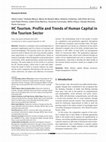
European Journal of Tourism, Hospitality and Recreation
Tourism is a strategic sector in Portugal since it generates employment and it is a factor of eco... more Tourism is a strategic sector in Portugal since it generates employment and it is a factor of economic and social development. The tourism sector not only has an intensive need of labour force but also provides employment opportunity to a range of qualifications. Being an industry of people, it directly depends on the performance of activities, skills, professionalism, quality and competitiveness. The main objective of this article is to present the HC Tourism project, which aims to seek and understand the needs of skills in tourism industry by studying the active companies that belong to the tourism economic subsectors, by region and subsector of economic activity. The methodology used in this project is based on a qualitative and quantitative approach, throughout the collection of primary and secondary data. The qualitative approach was based on a literature review which allowed to compile a list of 150 skills, divided under four domains: i) soft skills; ii) hard skills; iii) mana...











Uploads
Papers by Oscarina Susana Vilela Conceição
of the various roles played by research-based spin-offs (RBSOs) in knowledge
dissemination. It investigates if RBSOs act as connectors and knowledge
translators, both between different types of organisations within an innovation
ecosystem and across different geographical scales and knowledge
environments. This latter role has been relatively less investigated but is
important to open local innovation ecosystems. The paper analyses the
networks formed by Portuguese RBSOs in the context of research, technology
and product development projects. The results suggest that RBSOs play an
intermediary role in the country’s innovation ecosystem, which can assume
different forms. In the national networks, they frequently bridge research and
downstream organisations, contributing to the dissemination of knowledge
within the ecosystem. In the international networks, their most important role
may be as connectors and conveyors of advanced knowledge produced in
external knowledge environments.
of the various roles played by research-based spin-offs (RBSOs) in knowledge
dissemination. It investigates if RBSOs act as connectors and knowledge
translators, both between different types of organisations within an innovation
ecosystem and across different geographical scales and knowledge
environments. This latter role has been relatively less investigated but is
important to open local innovation ecosystems. The paper analyses the
networks formed by Portuguese RBSOs in the context of research, technology
and product development projects. The results suggest that RBSOs play an
intermediary role in the country’s innovation ecosystem, which can assume
different forms. In the national networks, they frequently bridge research and
downstream organisations, contributing to the dissemination of knowledge
within the ecosystem. In the international networks, their most important role
may be as connectors and conveyors of advanced knowledge produced in
external knowledge environments.